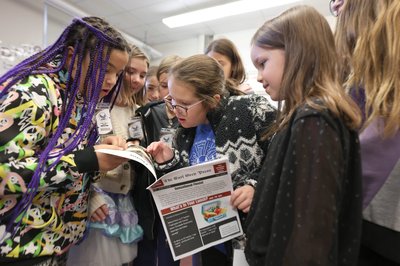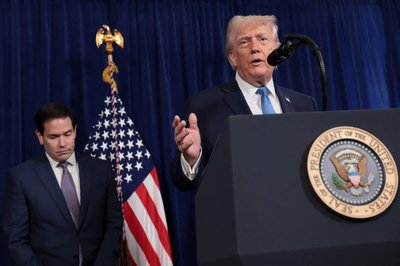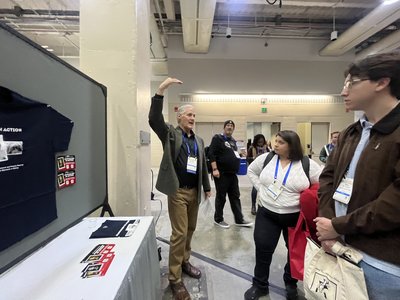by Rebecca Chambers, teacher and journalist
My eight-year-old son can't sleep because he just watched a YouTube video wherein an Elf on the Shelf comes to life and terrorizes a home. I try to reassure him that that didn't happen in real life, but he tells me the video description said it was "based on a true story." Oh dear. I realize I have more work to do in teaching him about internet safety and misinformation online.
I see similar red flags in the behavior of my high school students. But instead of videos about evil elves, they are being lured by polarized gender stereotypes and online gambling. Although our school introduced a ban on cell phones last year, I know these kids spend much of their lives online, even as they lack knowledge about how to be safe and responsible consumers and creators.
Although our school introduced a ban on cell phones last year, I know these kids spend much of their lives online, even as they lack knowledge about how to be safe and responsible consumers and creators.
We teachers are all too aware of the role that media of all types plays in the lives of our students, and the challenges it presents to their learning and development. In my side-hustle job as newspaper columnist, this has been a frequent topic of conversation with my editor, whose youngest daughter only just graduated high school. Our conversations have focused on the alignment of news and learning, and our shared goals of ensuring people have the information they need to make decisions that impact the world they want to live in. Eventually, I floated a solution.
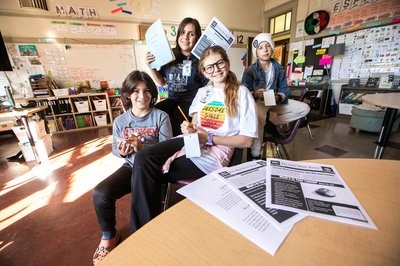
Image courtesy of Ruth Bonneville/Winnipeg Free Press
What if we leveraged the unique opportunities and expertise of our large, independent newspaper to deepen understanding of media literacy for our province's students? "It's a nice thought," he said, "but the newspaper doesn't have the budget for that kind of thing."
So I phoned the minister of education with our pitch, and found myself reassigned full-time to bring this project to life, alongside another teacher sponsored by the Winnipeg School Division.
Fast forward a couple of years, and you'll find me among the guests in a fourth grade classroom for the launch announcement of the first part of the Winnipeg Free Press Media Literacy & Learning site — a student journalism online starter kit, school newspaper incubator and newsstand for student work. The event was (of course) covered in the paper.
Research suggests teachers are motivated to teach media literacy, but we often don't know where to start. Additionally, many resources are formatted in ways that require time-consuming pre-reading and finding of media examples to use, and also rarely relate directly to the curriculum and subject we're teaching. A major goal of our platform has been to tailor media literacy content to the real-world context of current classroom teaching.
Research suggests teachers are motivated to teach media literacy, but we often don't know where to start.
Instead of requiring teachers to dig through the news to find stories relevant to their subject area, we created software that reads the paper each day and assigns the stories to curriculum areas. We removed the paper's paywall from hundreds of those stories, and we continue to add to that list every day. We also made an area specifically with news appropriate for young children, providing an instant gateway into current events for even the youngest learners. You can see the daily additions to that category on my Bluesky account.
In response to the teachers who told us they want to explore these topics but don't know where to start, we've created all-in-one startup guides to create student journalism. These guides contain all the information, lesson plans, activities and materials to go from zero knowledge about student journalism to producing a first edition of a student paper. Supplemental lessons and materials can be found in Free Press 101, which include classroom resources on topics of journalistic integrity and ethics, as well as learning opportunities about what it means to be an independent publication, how to structure an interview, careers in print journalism and more.
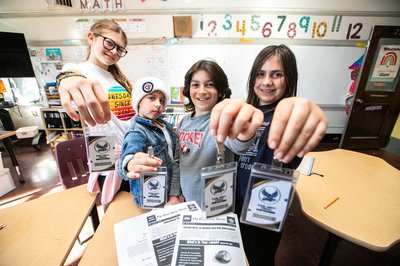
Image courtesy of Ruth Bonneville/Winnipeg Free Press
To address barriers to publication, layout and distribution of student news, we created a web-based app for generating newspapers. This click-and-drag interface was intentionally designed to have nearly no barrier to usage, and no learning curve. Manitoba-based teachers can also upload their completed newspapers to the newsstand, building pride in young journalists and presenting a platform for inter-school relationships and understanding. Even if you're not based in Manitoba, all the features are free and no login is required. Student papers created with the web app can be saved, downloaded and printed with no extra steps and no registration required.
The feedback we've received from teachers since our launch has been overwhelmingly positive. By next spring, we'll have resources that are targeted to media literacy concepts and can be paired with curricula-specific news items for classroom lessons that don't require us to "step outside" of our assigned curriculum, while still equipping students to engage in the fast-changing media environment around them. Eventually, we'll also be adding a teacher training portal, answering the call for the upskilling we need in our work in order to stay current too.
The unprecedented level of institutional cooperation needed to make this project a reality is truly incredible, and gives me great faith in the future of education and democracy. Please feel free to reach out with any questions or suggestions for the site. We're happy to keep it evolving.
About the author
Rebecca Chambers is a high school teacher and newspaper columnist in Winnipeg, Manitoba. A lifelong learner, she is nearly finished her M. Ed at the University of Manitoba. She also holds degrees in music and education, and college diplomas in apparel design and small business management. Rebecca's diverse experiences and interests leave her constantly drawing connections between ideas and creating community from disparate groups. At the paper, Rebecca writes about the impacts of current events upon the identity of Winnipeggers, and how what we do illustrates who we are, for good or ill.
If you would like to pitch an Educator Voice article to News Hour Classroom, contact education@newshour.org.
Sign up to receive our weekly newsletter with Daily News Lessons and community events.
To provide feedback on News Hour Classroom's resources, click here.
